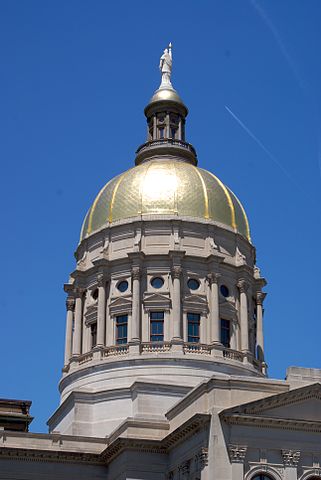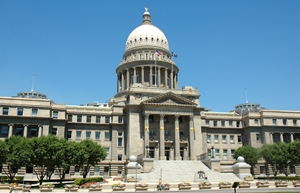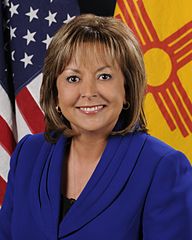April 18, 2017 •
California Lawmakers Introduce Bill to Move Up Presidential Primary
Lawmakers are considering a bill to move up California’s presidential primary election date. Senate Bill 568 seeks to move the presidential primary date from the first Tuesday in June to the third Tuesday in March. The move is aimed at […]
 Lawmakers are considering a bill to move up California’s presidential primary election date.
Lawmakers are considering a bill to move up California’s presidential primary election date.
Senate Bill 568 seeks to move the presidential primary date from the first Tuesday in June to the third Tuesday in March.
The move is aimed at getting presidential candidates to prioritize issues important to Californians during the primary process.
Senate Bill 568 would also move up primary elections in statewide office and legislative races to help eliminate potential voter confusion from multiple election dates.
April 18, 2017 •
Tuesday’s Government Relations and Ethics News
Campaign Finance “Bipartisan Bill Would Restructure FEC to End Gridlock” by Kenneth Doyle for Bloomberg BNA District of Columbia: “More Contributions to D.C. Council Member Cannot Be Tracked to Source” by Aaron Davis for Washington Post Ethics “With Trump Appointees, […]
 Campaign Finance
Campaign Finance
“Bipartisan Bill Would Restructure FEC to End Gridlock” by Kenneth Doyle for Bloomberg BNA
District of Columbia: “More Contributions to D.C. Council Member Cannot Be Tracked to Source” by Aaron Davis for Washington Post
Ethics
“With Trump Appointees, a Raft of Potential Conflicts and ‘No Transparency’” by Eric Lipton, Ben Protess, and Andrew Lehren for New York Times
Alabama: “Judicial Ethics Complaint Filed Against Judge Who Ordered Halt to Bentley Impeachment Hearing” by Kent Faulk for AL.com
California: “Oakland Ethics Panel Slams Lax Oversight of Free Warriors, Raiders and A’s Tickets” by Mark Hedin for East Bay Times
Legislative Issues
Nevada: “Republican Lawmaker Spent Two Weeks as ‘Legislative Advocate’ for Business Group” by Riley Snyder for Nevada Independent
Lobbying
Illinois: “Emanuel Still Fielding Emails on City Matters Via Private Account” by Fran Spielman for Chicago Sun-Times
Missouri: “Decrease in Lobbyists’ Gifts Hasn’t Limited Influence at the Missouri Capitol” by Sky Chadd for Columbia Missourian
Tech and Social Media
“Social Media Is Not Contributing Significantly to Political Polarization, Paper Says” by Jonah Engel Bromwich for New York Times
A revolving door bill introduced in the U.S. House would hold congressional salaries in escrow unless a fiscal budget is passed this week. House Bill 1951, The No Ongoing Perks Enrichment Act (NOPE ACT), which would establish a uniform five-year […]
 A revolving door bill introduced in the U.S. House would hold congressional salaries in escrow unless a fiscal budget is passed this week.
A revolving door bill introduced in the U.S. House would hold congressional salaries in escrow unless a fiscal budget is passed this week.
House Bill 1951, The No Ongoing Perks Enrichment Act (NOPE ACT), which would establish a uniform five-year post-employment ban on lobbying by former members of Congress, also requires the salaries of members of a House be held in escrow if the House has not agreed to a concurrent resolution on the budget for fiscal year 2018 by April 15, 2017.
The bill, introduced by Rep. Tom O’Halleran, additionally eliminates automatic pay adjustments for members of Congress and prohibits the use of funds provided for the official travel expenses of members of Congress and other officers and employees of the legislative branch for first-class airline accommodations. “Congress must act to restore confidence in our government, and that starts by cutting special privileges and promoting transparency,” O’Halleran said in his press release.
April 12, 2017 •
Wednesday’s Government Relations and Ethics News
Lobbying Missouri: “Limit on Lobbyist Gifts Clears Missouri Senate Committee” by Jason Hancock for Kansas City Star Campaign Finance California: “Anti-Pot Group Faces Campaign Finance Violations from Its Work Opposing Marijuana Legalization in California” by Patrick McGreevy for Los Angeles […]
 Lobbying
Lobbying
Missouri: “Limit on Lobbyist Gifts Clears Missouri Senate Committee” by Jason Hancock for Kansas City Star
Campaign Finance
California: “Anti-Pot Group Faces Campaign Finance Violations from Its Work Opposing Marijuana Legalization in California” by Patrick McGreevy for Los Angeles Times
New York: “Investigations into De Blasio Spurred City Reform, Renewed Calls for State Changes” by Samar Khurshid for Gotham Gazette
Ethics
“Secret A.T.F. Account Paid for $21,000 Nascar Suite and Las Vegas Trip” by Matt Apuzzo for New York Times
Michigan: “Michigan Sen. Bert Johnson Indicted by Grand Jury” by Paul Egan and Kathleen Gray for Detroit Free Press
South Carolina: “New SC Ethics Law Does Not Go Far Enough, Critics Say” by Avery Wilks for The State
Elections
Texas: “Federal Judge Says Texas Voter ID Law Intentionally Discriminates” by Manny Fernandez for New York Times
Legislative Issues
Oklahoma: “LGBTQ Group’s Capitol Visit Prompts Mass Email About ‘Cross-Dressers in the Building’” by Randy Krehbiel for Tulsa World
Procurement
California: “Feds: Well-known Oakland contractors conspired to cheat government” by Malaika Fraley for East Bay Times
April 7, 2017 •
News You Can Use Digest – April 7, 2017
Federal: DOJ Renews Promise of Action on Lobbying Law Compliance Bloomberg BNA – Kenneth Doyle | Published: 4/5/2017 The Government Accountability Office’s (GAO) annual report on Lobbyist Disclosure Act (LDA) compliance noted the Justice Department expects to take action on […]

Federal:
DOJ Renews Promise of Action on Lobbying Law Compliance
Bloomberg BNA – Kenneth Doyle | Published: 4/5/2017
The Government Accountability Office’s (GAO) annual report on Lobbyist Disclosure Act (LDA) compliance noted the Justice Department expects to take action on four “chronic offenders” of the law. The report said House and Senate officials in charge of administering the LDA have referred thousands of cases of noncompliance, but the U.S. attorney’s office has been able to resolve only about half of these cases through letters and other contacts seeking compliance. The GAO said officials believe many of those who fail to file disclosure reports are no longer lobbying. But more than 1,300 referrals regarding failure to file lobbying reports remained unresolved last year. Meanwhile, another 700 referrals for failing to file required reports on lobbyists’ political contributions also remained unresolved.
Ethics Panel Opens Investigation into Nunes
The Hill – Cristina Marcos and Katie Bo Williams | Published: 4/6/2017
House Intelligence Committee Chairperson Devin Nunes (R-Calif.) temporarily recused himself from all matters related to the panel’s ongoing probe into Russia’s interference in the presidential election. The House ethics committee released a statement saying it would investigate allegations that “Nunes may have made unauthorized disclosures of classified information, in violation of House rules, law, regulations, or other standards of conduct.” Nunes has come under fire for going to the White House grounds to meet with a secret source and view documents he said suggest President Trump and his transition team members’ identities may have been improperly revealed in reports on surveillance of foreign targets.
Former Trump Staffers Hunt for Foreign Lobbying Work
Politico – Theodoric Mayer, Kenneth Vogel, and Josh Dawsey | Published: 4/3/2017
Some of President Donald Trump’s former campaign hands are rushing to sign lucrative deals with foreign clients, shrugging off their own pledges to avoid foreign lobbying and the president’s vow to “drain the swamp.” Former Trump campaign manager Corey Lewandowski’s firm is one a handful of upstarts looking to undercut the lobbying giants that for years dominated the market for foreign lobbying work in Washington. They are betting their experience on Trump’s campaign and relationships with former colleagues now in his administration can woo foreign governments away from more established rivals.
Trump Can Quietly Draw Money from Trust Whenever He Wants, New Documents Show
Washington Post – Drew Harwell | Published: 4/3/2017
The trust agreement that Donald Trump used to put his adult sons in charge of his company allows him to draw money from it upon his request, illustrating the thin divide between the president and his private fortune. Trump and his attorneys have pointed to the Donald J. Trump Revocable Trust as a response to widespread worries from ethics lawyers, who have said the president’s refusal to divest ownership of his company creates the potential that he can derive personal profit from his public office. Trump’s trust is not “blind” because he knows how his assets are performing, has close relationships with both trustees, can make money off the trust’s financial interests, and can revoke the trust at any time.
From the States and Municipalities:
Alabama – Ethics Commission Finds Probable Cause Against Gov. Robert Bentley
AL.com – Mike Cason | Published: 4/5/2017
Gov. Robert Bentley could face criminal prosecution after the Alabama Ethics Commission found probable cause he broke ethics and campaign finance laws in a sex-tinged scandal that has engulfed him for over a year. The commission voted to refer four issues to the Montgomery County district attorney’s office, which will decide whether to pursue charges. The commission found probable cause to believe Bentley had misused state resources and campaign funds, improperly accepted a campaign donation outside of an allowed fundraising window, and lent himself campaign money when he was not a candidate. Bentley has been under scrutiny since recordings surfaced last year of him making suggestive remarks to a female aide before his divorce.
Arizona – Arizona Secretary of State’s Website to Track Political Spending Triples in Cost
Arizona Republic – Mary Jo Pitzl | Published: 3/29/2017
It was a key talking point of her 2014 campaign for secretary of state: Michele Reagan would build a website to allow the public to track the money spent in political campaigns, from the governor’s office down to the smallest town-council race. But the much-touted See the Money website has yet to materialize, despite a nearly $500,000 investment, a now-completed contract with an outside firm, and a string of promised due dates. Reagan said she is moving the project in-house and is determined to have it online by January.
Colorado – A Dark Money Lawsuit, a Colorful Cast of Characters, and Colorado’s Citizen Campaign Finance Cop
Colorado Independent – Corey Hutchins | Published: 4/4/2017
The best drama in Colorado politics is not occurring at the Capitol, but in a courtroom. The characters in the dispute are half the intrigue. At issue is the question of whether it is legal for someone to set up a nonprofit to shield donors from disclosure even when that nonprofit works almost exclusively, through an affiliated entity, on campaigns for or against candidates. In Colorado, anyone who lodges a complaint about a suspected campaign finance violation has to prove his or her own case against an alleged violator in a courtroom setting. It is a system its critics say discourages average citizens from bringing complaints against powerful people or well-funded groups.
Florida – Hillsborough Commissioners Add Themselves to New Lobbying Ordinance
SaintPetersBlog.com – Mitch Perry (Florida Politics) | Published: 4/5/2017
Registered lobbyists can no longer text or email Hillsborough County commissioners during meetings. Lobbyists who violate the new ordinance can be punished with a ban of up to a year, though it would take four violations to reach that. Commissioners that violate the ban and do not report communications sent to them during meeting will be punished with a $250 fine on the first offense and $500 on the second. If a third violation occurs, the Florida Commission on Ethics will be notified.
Kansas – These High School Journalists Investigated a New Principal’s Credentials. Days Later, She Resigned.
Washington Post – Samantha Schmidt | Published: 4/5/2017
A group of reporters and editors from the student newspaper, the Booster Redux at Pittsburg High School in Kansas, had gathered to talk about Amy Robertson, who was hired as the high school’s head principal on March 6. The student journalists had begun researching Robertson, and quickly found some discrepancies in her education credentials. When they researched Corllins University, the private university where Robertson said she got her master’s and doctorate degrees, the website did not work. They found no evidence it was an accredited university. The students began digging into a weeks-long investigation that would result in an article questioning the legitimacy of the principal’s degrees and of her work as an education consultant. Robertson resigned four days later.
Maine – Lying-to-Legislature Bill Narrowed to Apply to Lobbyists Only
Portland Press Herald – Kevin Miller | Published: 4/3/2017
A legislative committee voted in favor of a bill to make it a crime for lobbyists to lie to Maine lawmakers after narrowing a bill to exclude the public, and themselves. Maine is one of nine states that have no laws against providing false information in committee. Fifteen states plus the District of Columbia prohibit lobbyists from providing false testimony, and some states require speakers to take an oath before testifying in committee.
North Carolina – Lawmakers Revive Plan for Combined State Elections, Ethics Board
WRAL – Matthew Burns | Published: 4/4/2017
House Republicans would prefer changing a law struck down by a three-judge panel related to overseeing North Carolina elections instead of extending a court fight with new Gov. Roy Cooper. A new measure approved by the Elections Committee would rework an eight-member state panel overseeing both elections and ethics rules the judges threw out as unconstitutional and give more control over the board to Cooper. The revised bill would still merge the elections and ethics boards, but the governor would be able to appoint all members from nominations made by the state Republican and Democratic parties. The board would be split evenly between the two parties.
Pennsylvania – Have Bribery, Fraud and Abuse of Power Become Synonymous with ‘Pennsylvania’?
PennLive.com – Jan Murphy | Published: 3/30/2017
Pennsylvanians have witnessed scores of corruption cases involving state officials from both sides of the political aisle and all three state governmental branches. Whether it is on a per-capita basis or simply the sheer number of high-profile corruption cases in recent years, Muhlenberg College political scientist Chris Borick said it is obvious that “something is pretty wrong in our political system in terms of corruption.” Some blame it on lax rules that do not hold government officials accountable or lawmakers’ failure to enact reform laws such as a ban on gifts or limits on campaign contributions. Though watchdogs continue to seek such reforms, little progress has been made in the Legislature.
Tennessee – Analysis: Possible double dipping at Tennessee statehouse
The Tennessean – Dave Boucher and Joel Ebert | Published: 3/31/2017
A review of campaign finance reports filed in 2016 by all 131 current Tennessee lawmakers found state representatives and senators spent $189,700 combined in campaign money on expenses that may have been paid for by state funds. But lawmakers are not required to report specific dates and locations of smaller purchases that are typically less than $100. That makes it unclear how many of those expenses also may have been reimbursed by the state, providing the opportunity to obscure double dipping or other financial abuse.
Tennessee – Nashville’s Private Club with a PAC
The Tennessean – Joel Ebert and Dave Boucher | Published: 4/2/2017
Many nights, the most powerful Tennessee lawmakers imbibe and eat at The Standard, a restaurant a few blocks from the Capitol. Often, it is at the expense of their campaign donors. An analysis found 25 Tennessee legislators and one prominent Nashville elected official, or their PACs, combined with seven other state PACs to spend $150,000 from their campaign coffers at the restaurant and club since 2009. More than $50,000 of that money was spent by elected officials to pay for their personal memberships in the club. The Standard also operates its own state PAC, which has donated almost $100,000 to state and local leaders who are members or who frequent the club.
Vermont – Vermont’s Campaign Finance Law Survives Legal Challenge
U.S. News & World Report; Associated Press – | Published: 4/3/2017
A challenge to Vermont’s campaign finance laws has been struck down in federal court. Dean Corren, an unsuccessful candidate for lieutenant governor, sued the state for violating his First Amendment rights, alleging a restriction on fundraising for publicly financed candidates is unconstitutional.
 State and Federal Communications produces a weekly summary of national news, offering more than 60 articles per week focused on ethics, lobbying, and campaign finance.
State and Federal Communications produces a weekly summary of national news, offering more than 60 articles per week focused on ethics, lobbying, and campaign finance.
April 6, 2017 •
Thursday’s Government Relations and Ethics News
Campaign Finance Colorado: “A Dark Money Lawsuit, a Colorful Cast of Characters, and Colorado’s Citizen Campaign Finance Cop” by Corey Hutchins for Colorado Independent Ethics “It’s Plausible Trump Incited Violence, Federal Judge Rules in OK’ing Lawsuit” by Eliott McLaughlin for […]

Campaign Finance
Colorado: “A Dark Money Lawsuit, a Colorful Cast of Characters, and Colorado’s Citizen Campaign Finance Cop” by Corey Hutchins for Colorado Independent
Ethics
“It’s Plausible Trump Incited Violence, Federal Judge Rules in OK’ing Lawsuit” by Eliott McLaughlin for CNN
“How the U.S. Ethics Chief Took on Trump and Became a Reluctant Washington Hero” by David Montgomery for Washington Post
“Russian Spies Tried to Recruit Carter Page Before He Advised Trump” by Adam Goldman for New York Times
Kansas: “These High School Journalists Investigated a New Principal’s Credentials. Days Later, She Resigned.” by Samantha Schmidt for Washington Post
North Carolina: “Lawmakers Revive Plan for Combined State Elections, Ethics Board” by Matthew Burns for WRAL
Legislative Issues
Minnesota: “House DFL Leader Won’t Back Down from ‘White Male Card Game’ Remarks” by Brian Bakst for Minnesota Public Radio
Lobbying
Florida: “Hillsborough Commissioners Add Themselves to New Lobbying Ordinance” by Mitch Perry (Florida Politics) for SaintPetersBlog.com
Texas: “Jet Setting Liquor Regulators Could See Wings Clipped by Lawmakers” by Jay Root for Texas Tribune
Lawmakers are back to work attempting to combine state elections and ethics boards after a three-judge panel ruled that the General Assembly overstepped its state constitutional authority when it adopted Senate Bill 4 establishing a bipartisan board to oversee elections […]
 Lawmakers are back to work attempting to combine state elections and ethics boards after a three-judge panel ruled that the General Assembly overstepped its state constitutional authority when it adopted Senate Bill 4 establishing a bipartisan board to oversee elections and consider ethics complaints and issues.
Lawmakers are back to work attempting to combine state elections and ethics boards after a three-judge panel ruled that the General Assembly overstepped its state constitutional authority when it adopted Senate Bill 4 establishing a bipartisan board to oversee elections and consider ethics complaints and issues.
The House Elections Committee approved changes to Senate Bill 68 to remove the bill’s original content relating to school attendance, replacing it with a reworked proposal to create a Bipartisan State Board of Elections and Ethics Enforcement.
Senate Bill 68 would merge the elections and ethics boards, but the governor would be able to appoint all members from nominations made by North Carolina’s Republican and Democratic parties. The board would be split evenly between the two parties.
Senate Bill 68 is set for a floor vote in the House on April 5.
March 31, 2017 •
Kentucky Legislature Adjourns 2017 Regular Session
The Kentucky General Assembly adjourned the 2017 regular session sine die on March 30, 2017. Working late into the evening, lawmakers approved several bills to send to Gov. Matt Bevin’s desk. The Republican-controlled legislature passed right-to-work and anti-abortion bills, as […]
 The Kentucky General Assembly adjourned the 2017 regular session sine die on March 30, 2017. Working late into the evening, lawmakers approved several bills to send to Gov. Matt Bevin’s desk.
The Kentucky General Assembly adjourned the 2017 regular session sine die on March 30, 2017. Working late into the evening, lawmakers approved several bills to send to Gov. Matt Bevin’s desk.
The Republican-controlled legislature passed right-to-work and anti-abortion bills, as well as a repeal of a prevailing wage law.
Stronger controls over prescription pain medication and penalties for trafficking synthetic opioids were also approved.
The next legislative session begins in January, 2018.
March 31, 2017 •
Georgia Legislature Adjourns 2017 Regular Session
The Georgia Legislature adjourned the 2017 regular session sine die yesterday, March 30, 2017. In the final days of the session, lawmakers tackled issues such as a campus gun bill, tax credits, and medical marijuana. Georgia is one of 17 […]
 The Georgia Legislature adjourned the 2017 regular session sine die yesterday, March 30, 2017.
The Georgia Legislature adjourned the 2017 regular session sine die yesterday, March 30, 2017.
In the final days of the session, lawmakers tackled issues such as a campus gun bill, tax credits, and medical marijuana.
Georgia is one of 17 states prohibiting guns on university campuses and Gov. Nathan Deal has shown his opposition to the issue, particularly by vetoing a similar bill last year.
March 30, 2017 •
Idaho Legislature Adjourns 2017 Session
The Idaho Legislature adjourned the 2017 regular session sine die on March 29, 2017. Major issues of this year’s session included proposed income tax cuts and funding for public schools. A handful of legislators will work through the interim on […]
 The Idaho Legislature adjourned the 2017 regular session sine die on March 29, 2017.
The Idaho Legislature adjourned the 2017 regular session sine die on March 29, 2017.
Major issues of this year’s session included proposed income tax cuts and funding for public schools.
A handful of legislators will work through the interim on updating the state’s public school funding formula. Many argue it is outdated and does not meet the needs of a modern education.
March 28, 2017 •
West Virginia Campaign Finance Bill Passes Senate
On March 27, the West Virginia Senate voted to approve a bill to overhaul campaign finance laws. Senate Bill 539 will raise campaign contribution limits to allow individuals to donate up to $2,700 to candidates for statewide office per election […]
 On March 27, the West Virginia Senate voted to approve a bill to overhaul campaign finance laws.
On March 27, the West Virginia Senate voted to approve a bill to overhaul campaign finance laws.
Senate Bill 539 will raise campaign contribution limits to allow individuals to donate up to $2,700 to candidates for statewide office per election cycle. Individuals would also be able to contribute up to $5,000 to PACs per year and $10,000 to state parties and caucus campaign committees per year.
The bill also proposes changes to disclosure requirements, allowing citizens to donate up to $1,000 to certain PACs that do not donate to individual candidates or their committees before the donor’s identity must be disclosed.
The bill now moves to the House for consideration.
March 28, 2017 •
Tuesday’s Government Relations and Ethics News
Campaign Finance Illinois: “Court Strikes Down Ban on Campaign Contributions from Medical Marijuana Licensees” by Jacob Huebert for Illinois Policy Pennsylvania: “Judge Mid-Trial Dismisses All Charges in Pennsylvania Pay-to-Play Case” by Angela Couloumbis and Craig McCoy (Philadelphia Inquirer) for Pittsburgh […]
 Campaign Finance
Campaign Finance
Illinois: “Court Strikes Down Ban on Campaign Contributions from Medical Marijuana Licensees” by Jacob Huebert for Illinois Policy
Pennsylvania: “Judge Mid-Trial Dismisses All Charges in Pennsylvania Pay-to-Play Case” by Angela Couloumbis and Craig McCoy (Philadelphia Inquirer) for Pittsburgh Post-Gazette
Elections
“Senate Committee to Question Jared Kushner Over Meetings with Russians” by Jo Becker, Matthew Rosenberg, and Maggie Haberman for New York Times
Ethics
Maine: “Bangor City Council’s Ethics Watchdog Group Hasn’t Investigated a Violation in 20 Years” by Danielle McLean for Bangor Daily News
Maryland: “Maryland House Passes First Major Ethics Bill in Over a Decade” by Ian Duncan for Baltimore Sun
Oregon: “Lax Conflicts of Interest Rules Let Oregon Lawmakers Keep Quiet About Their Ties” by Gordon Friedman for Portland Oregonian
Legislative Issues
“Chairman and Partisan: The dual roles of Devin Nunes raise questions about House investigation” by Greg Miller and Karoun Demirjian for Washington Post
New Mexico: “Amending New Mexico’s Convoluted Constitution” by Anna Lande for KUNM
Lobbying
“Trump’s ‘Beachhead’ Teams Host Dozens of Former Lobbyists” by Ashley Balcerzak and Niv Sultan for Center for Responsive Politics
March 28, 2017 •
New Mexico Governor Will Likely Call a Special Session
Despite the 2017 regular session adjourning on March 18th, Gov. Susana Martinez will likely call a special session. Martinez does not like the budget proposed to her by the Legislature and has warned of potential furloughs if a new budget […]
 Despite the 2017 regular session adjourning on March 18th, Gov. Susana Martinez will likely call a special session.
Despite the 2017 regular session adjourning on March 18th, Gov. Susana Martinez will likely call a special session.
Martinez does not like the budget proposed to her by the Legislature and has warned of potential furloughs if a new budget is not passed soon.
The special session date has yet to be determined.
March 27, 2017 •
Wisconsin Legislators Consider Revolving Door Ban
Wisconsin legislators introduced a bill to prohibit lawmakers from lobbying for at least one year after leaving legislative office. The bill, identical to a bill proposed during the last legislative session, was introduced with wide bipartisan support. Current state law […]
 Wisconsin legislators introduced a bill to prohibit lawmakers from lobbying for at least one year after leaving legislative office.
Wisconsin legislators introduced a bill to prohibit lawmakers from lobbying for at least one year after leaving legislative office.
The bill, identical to a bill proposed during the last legislative session, was introduced with wide bipartisan support.
Current state law establishes a revolving door provision for state employees and officials seeking to become lobbyists; the prohibition does not, however, extend to legislators.
State and Federal Communications, Inc. provides research and consulting services for government relations professionals on lobbying laws, procurement lobbying laws, political contribution laws in the United States and Canada. Learn more by visiting stateandfed.com.


